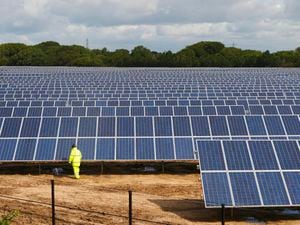Energy plan to create 1,000 low-carbon jobs
More than 1,000 new low-carbon jobs will be created and emissions slashed under an ambitious new energy strategy being unveiled for the region.

The Marches Local Enterprise Partnership says its new 10-year energy plan will also see half of the region’s electricity produced by renewable sources by 2030, a national pilot scheme developed for overcoming disruption to the National Grid and fuel poverty cut to below 10 per cent.
The LEP – which covers Shropshire, Telford & Wrekin and Herefordshire – will officially launch the energy strategy at a major conference in Ludlow called 'Planning for a Climate Emergency: Delivering a net zero carbon economy in the West Midlands' on July 25.
Key points in the blueprint include:
The creation of 1,000 new jobs in the low carbon and renewable energy sector across the region by 2030
Developing a pilot project to overcome National Grid constraints which will be used as a national demonstrator
Continuing to be a national leader in the deployment of anaerobic digestion
Carbon emissions, excluding agriculture, to be cut by 57 per cent from 1990 levels in line with UK targets
Reducing fuel poverty below 10 per cent
Renewable electricity to meet 50 per cent of local demand by 2030
To develop the region as a national centre of innovation in agriculture and low carbon transition
Graham Wynn, Marches LEP chairman, said: “We can only continue to grow our economy and create the sort of high-skilled high-pay jobs we all want for the region if we get our energy provision right.
“The Marches is an area with ambitious growth plans – we want to create 58,700 new jobs and 54,400 new homes over the next 20 years – and energy is a vital component in making sure we can meet those targets.

“The current energy infrastructure is already at capacity in many areas and while this is a threat to plans it is also an opportunity for us to invest in innovative solutions which also meet some of the environmental challenges facing us all.
“This strategy sets a clear path to both growing our economy and responding to the threat of climate change for the generations to come.”
The Ludlow conference, being held at the town’s racecourse, will bring together business, local government and community groups involved in creating the clean energy and low carbon economy transition in the West Midlands.
A series of workshops and presentations will run throughout the day, relating to local and neighbourhood planning, local governance and opportunities for business growth in the low carbon sector.
To book a ticket visit eventbrite.co.uk/e/planning-for-a-climate-emergency-delivering-a-net-zero-carbon-economy-in-the-west-midlands-tickets-63874857418.
Details of the energy plan and the jobs it will create have been released as it emerged manufacturing jobs in the West Midlands have fallen by 230,000 over the past 20 years – the biggest decline in the UK.
Official figures reveal the region has accounted for one in six of all manufacturing job losses in the country over the period.





